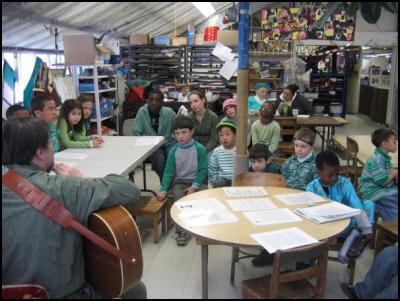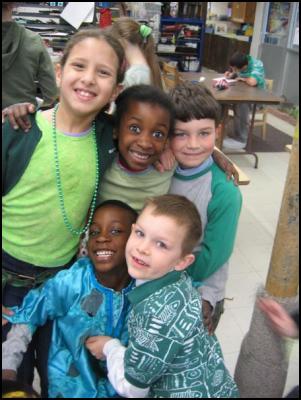Saint Patrick's Day And Missed Opportunity
Saint Patrick's Day And Missed Opportunity
by Daniel Patrick Welch

Another Saint Patrick's Day is here, with its tacky kegs of green beer, leprechauns, lucky charms, fake plastic hats and all imaginable variety of gaudy faux-Irish...um..."charm." But it needn't be so. The holiday offers up an incredible opportunity to expose children (and adults, of course) to the history of struggle of a courageous people-- England's first and last colony--and, by extension, to shed light on the legacy of colonization and imperialism and the universal nature of popular resistance.
At the risk of using one of the thankfully less egregious cliches, the Irish have long been a musical and literate people, a country where, as the poet said, "All her wars are merry, and all her songs are sad." Even the most cursory outline of Irish history yields a treasure trove of struggles, uprisings, and oppression--the practice field on which the British Empire honed its techniques. Fortunately, for those whose task is to educate, the songs are beautiful, moving, and largely self-explanatory.
While the diaspora revels in the Luck O' the Irish and sports "Kiss Me, I'm Irish" buttons, we'll be singing "The wearing of the Green," a concise, if simplified explication of the tradition of wearing green. Distilled by generations of mass marketing into Irish Pride, the practice was actually a passive form of resistance to British rule, symbolizing the culture, language, religion and traditions ruthlessly suppressed in the wake of the Wolfe Tone and other uprisings. "It's the most distressed country that you have ever seen/They're hanging men and women for the wearing of the green."
The color and practice are also a convenient symbol for the natural-- and unstoppable--force for human liberation. The shamrock, rather than a mere symbol of luck, is chosen for its resilience and invincibility: "You may take the shamrock from your hat and cast it on the sod/But it will take root and flourish there, though underfoot it's trod."
Popular resistance struggles have invoked the image of nature time and again to illustrate the inevitability of their victory. Sadly, of course, forces of reaction have been crafty and merciless in their exercise of power in repression. But hope springs eternal: "When the law can keep the blades of grass from growing where they grow/And when the leaves in summertime their verdure dare not show/Then I will change the color that I wear in my corbeen/But 'til that day, please God, I'll stick to wearing of the green."

With students from many different countries, the study of the Great Hunger--where almost half of Ireland's population either died or fled in the space of a generation--lends itself quite well to the general study of diaspora and immigration. Our mostly first-generation students are especially quick to grok the sense of isolation and distance felt by recent immigrants, and take to the strains of Danny Boy and The Leaving of Liverpool with a partiular warmth. The difference for their own generation is that their parents can travel back to Haiti, the DR, Puerto Rico, Thailand, China, Nigeria, Portugal, Russia or other countries from which they come. Those of African descent are also especially disposed to understand being robbed of their languages, culture and history, and so a cross- cultural vortex of people's history is easily explored.
Even the specific language has its overlaps. "Puedan cortar las flores, pero no pueden parar la primavera" is yet another testament to the use of natural imagery and the belief in the inevitability of liberation. And with this background easily prepared, children whose eyes might otherwise glaze over at the archaic language sit in rapt attention at the recitation of Padraig Pearse's The Rebel. Many of them, like Pearse's Rebel, are "come of the seed of the people." It is hardly a stretch that, by the end, they share the Rebel's scorn for his tormentors and his warning to his people's masters: "Beware. Beware of the thing that is coming. Beware of the risen people, who shall take what ye would not give. Did you think to conquer the people? Or that law is stronger than life, or than man's desire to be free?" It's always an exhiliarating moment, and a potent opportunity, to invest a holiday marketed as one more excuse to party with a bit more meaning and purpose--and hope, so that one day the "tyrants, hypocrites, and liars" might tremble at The Thing That is Coming.
© 2007 Daniel Patrick Welch. Reprint permission granted with credit and link to http://danielpwelch.com . Writer, singer, linguist and activist Daniel Patrick Welch lives and writes in Salem, Massachusetts, with his wife, Julia Nambalirwa-Lugudde. Together they run The Greenhouse School http://www.greenhouseschool.org . Translations of articles are available in over two dozen languages. Links to the website are appreciated at http://danielpwelch.com .


 Binoy Kampmark: Rogue States And Thought Crimes - Israel Strikes Iran
Binoy Kampmark: Rogue States And Thought Crimes - Israel Strikes Iran Eugene Doyle: The West’s War On Iran
Eugene Doyle: The West’s War On Iran Richard S. Ehrlich: Deadly Border Feud Between Thailand & Cambodia
Richard S. Ehrlich: Deadly Border Feud Between Thailand & Cambodia Gordon Campbell: On Free Speech And Anti-Semitism
Gordon Campbell: On Free Speech And Anti-Semitism Ian Powell: The Disgrace Of The Hospice Care Funding Scandal
Ian Powell: The Disgrace Of The Hospice Care Funding Scandal Binoy Kampmark: Catching Israel Out - Gaza And The Madleen “Selfie” Protest
Binoy Kampmark: Catching Israel Out - Gaza And The Madleen “Selfie” Protest